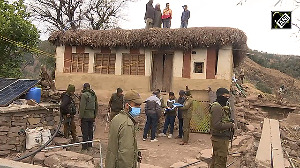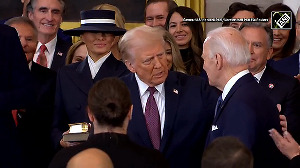The recent migration of marquee investments from Maharashtra to Gujarat seems to have rekindled the Marathi manoos sentiment.

The partnership between the Eknath Shinde faction of the Shiv Sena and the Bharatiya Janata Party, sealed in June this year after Shinde broke away from Uddhav Thackeray (then the chief minister heading the Maha Vikas Aghadi coalition government) with a majority of Sena legislators and tied up with the BJP in Maharashtra, has sparked a debate about political profit and loss.
The question is, which group has gained the most -- Shinde, Uddhav or the BJP -- from these developments?
There is evidence that the idea of the Marathi manoos (sons of soil) may have been re-crafted. Behind the Hindutva appeal and the premium that development and infrastructure command, Maharashtra has a nativist underlay that surfaces in the Marathi manoos political slogan each time the Marathi-speaking population opposes migrants from other states.
"The Marathi manoos are not solidly with Shinde. It was apparent during the Dussehra rallies he and Uddhav held. Uddhav was strong on emotion, Shinde high on optics," says Sudhir Suryawanshi, author of Checkmate: How the BJP Won and Lost Maharashtra.
Discussions are ongoing over whether Shinde, the current chief minister, has gained tangibly in the past five months or has merely "allowed" the BJP to play first fiddle.
As the Uddhav group of the Sena is lying low -- except for staging the customary Dasra melava (Dussehra rally) in Mumbai's Shivaji Park on October 5 and addressing press conferences -- the long-delayed election to the cash-rich BrihanMumbai Municipal Corporation, expected to be held by the year-end, will be the first test of the viability of the Shinde Sena-BJP alliance and the relevance of the out-of-power Uddhav Sena-Congress-Nationalist Congress Party coalition.
A Mumbai-based political observer's view was "Shinde has gained by winning the support of most Sena MLAs."
On the other hand, by virtually decimating the Uddhav group and splitting the Sena, the BJP has removed the last obstacle ahead of the 2024 Lok Sabha polls.
Maharashtra has 48 parliamentary seats. In 2014 and 2019, the BJP and undivided Sena together won 41 seats, reducing the Congress-NCP to a rump.
Given the electoral arithmetic, to keep power, the BJP cannot afford to lose a single seat in the western state. Apart from MLAs, Shinde commands the backing of most Sena MPs.
The recent migration of marquee investments from Maharashtra to Gujarat seems to have rekindled the Marathi manoos sentiment.
After the Centre handed Rs 78,000 crore (Rs 780 billion) for an international financial services sector in Ahmedabad in the shape of the Gujarat International Finance Tec-City (GIFT City) and announced a gems and jewellery cluster and a diamond bourse in Maharashtra's neighbour, Maharashtra also lost the mega Vedanta-Foxconn and the Tata-Airbus projects to Gujarat.
The Vedanta-Foxconn venture, pegged at a cost of Rs 1.54 trillion, was in advanced stage of talks with the Maharashtra government whose key offer was of a capital subsidy of up to 30 per cent for setting up the plant in the Talegaon industrial area on Pune's periphery.
The project was estimated to bring in Rs 26,200 crore (Rs 262 billion) state goods and services tax, 80,000 to 1,000,000 direct and indirect job openings, and $21- billion direct and $5 billion to $8 billion additional investments to speed up growth.
Neelam Gorhe, a deputy leader of the Uddhav Shiv Sena, was quoted as saying, 'Moving industries to Gujarat at the cost of Maharashtra is like amputating a part of the state's body.'
Priyanka Chaturvedi, the Rajya Sabha MP and the Uddhav Shiv Sena's deputy leader in the Upper House, says, "The impact of these moves is political."
Maharashtra and Gujarat were historically competitive. Their rivalry goes back to 1960, when Maharashtra was created as a separate state. There was a demand that Mumbai should be the capital of both Maharashtra and Gujarat, but the people of Maharashtra opposed it.
"If a big-ticket project was relocated to another state from Maharashtra, the decision might not have evoked such resentment," says Suryawanshi.
The Maharashtra BJP defended the move. Keshav Upadhye, the state BJP chief spokesperson, maintained, "There's a lot of misinformation. There was no follow-up of these projects when MVA was in power."
Thane Mayor Naresh Mhaske, spokesperson for the Shinde Shiv Sena, adds, "The land rate is much higher in Talegaon, so Foxconn found Gujarat more cost-effective. If the project was to be located in Vidarbha, things might have been different."
BJP leader and Maharashtra's Deputy CM Devendra Fadnavis alleged at a press conference that, 'Opposition parties, their entire ecosystem, and a few journalists are creating a fake narrative by claiming that industries are going out of the state.'
To Fadnavis's charge, Anil Desai, the Uddhav Shiv Sena's Rajya Sabha MP, asks, "It isn't true that the MVA did not attempt to retain businesses. If that was the case, as Maharashtra's main Opposition then, why did the BJP keep mum?"
"The effect of the BJP's double engine growth slogan is seen only when they have a government in the state, not when there's a coalition," adds Desai.
Asked if the migration of industries could play out as an issue in the BMC polls, Chaturvedi says, "Of course. Mumbai is the engine that drives Indian business."
"This has no relation to the municipal elections," says Mhaske. "Our theme is the massive corruption in the BMC under the Uddhav Sena."












 © 2025
© 2025